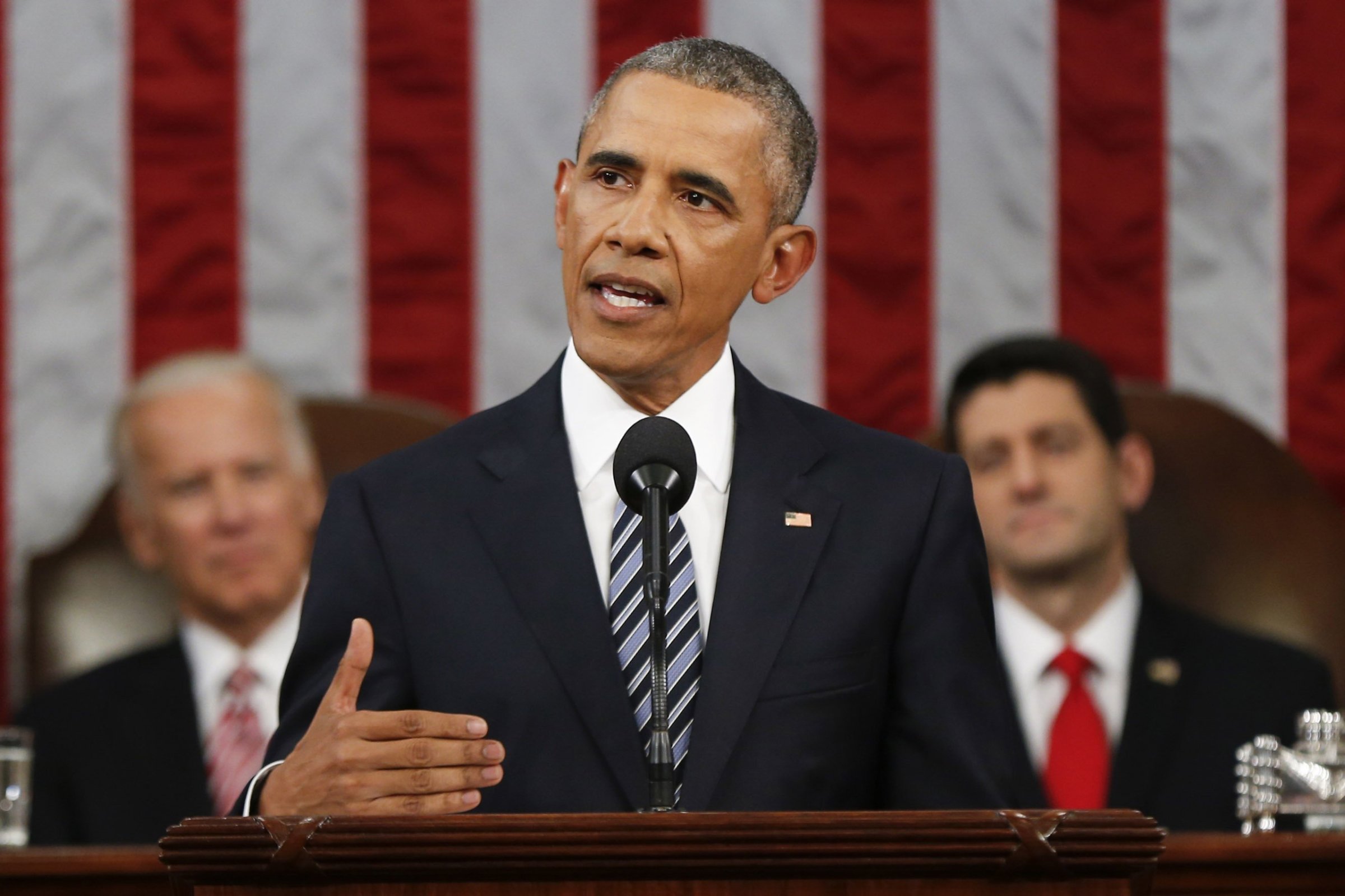
President Obama’s last State of the Union speech was a solid, reasonable affair, even if his delivery was weird. He sounded frustrated, at times almost disdainful. It was, in a strange way, the presidential response to the State of the Union that Republican candidates have been describing for months on the campaign trail, especially Donald Trump. Indeed, South Carolina Governor Nikki Haley’s official response was a response to Trump too.
Obama’s tone was playground grievance: Hey, c’mon, guys, he seemed to be saying, as in, Hey c’mon, guys, when he said you’re “peddling fiction” if you don’t think our economy is the “strongest in the world,” with 14 million new jobs and 5% unemployment and deficits reduced by three-quarters. Or, Hey, c’mon, guys, our military isn’t in decline or being hollowed out, as the Republicans claim; we are “the most powerful nation on earth. Period.”
Read more: How to Watch Tonight’s Republican Debate Online
If the purpose of the speech was to reassure a jittery country, I’m not sure he succeeded, even though the achievements he described are real and–despite the GOP disinformation campaign–remarkable. His has been a successful presidency. He’s done the most important things: his policies pulled us out of a scary economic ditch, and he managed to keep us safe–as safe as can reasonably be expected–in a world that is careening toward chaos. So why wasn’t the speech entirely convincing?
One problem is that it was essentially defensive. Another is that he wasn’t entirely honest about the difficulties we’re facing. He may be right, for example, that staying out of Syria militarily was the “smarter” course for us to take, but that seemed to imply that being smart was the best we could hope for. It isn’t. Syria is an ungodly mess, infecting the rest of the region. The President did say we’re facing a generation of chaos in the Middle East, but he might have acknowledged that we haven’t figured out a way to ameliorate that chaos. The problem is, there are no easy ways, a fact that doesn’t sit well in a Twitter democracy. He might have acknowledged, too, that he underestimated and was slow to respond to ISIS. Still, Hey, c’mon, guys, does Ted Cruz really think his carpet-bomb rhetoric is going to straighten things out?
Obama did express a regret, which is a big thing for a President. George W. Bush never did, when it came to Iraq, and Bill Clinton has never copped to being wrong about deregulating Wall Street. But Obama’s regret–that the political tone in Washington has gotten worse during his presidency–wasn’t a real one. He didn’t acknowledge that he had contributed to the problem. Indeed, Haley was far more forthcoming in her response, saying “we” Republicans “have played a role in how and why our government is broken.” Her oblique condemnation of Trump was also more direct and impressive than the President’s because it came from a Republican. She warned against listening to the “siren call of the angriest voices” or “falsely [equating] noise with results.” And for good measure she called the Charleston shooter “a domestic terrorist” and said Republicans “would respect differences in modern families” while respecting “religious liberty.” The woman has a future–if the Republican Party’s sanity caucus ever regains control.
Obama ended his speech with a call for citizenship. I’m usually a sucker for his perorations, but this one struck me as a bit thin. He seems to think that instituting the Democratic Party’s agenda–more access to voting, curbing campaign spending–will solve the nation’s citizenship shortfall.
Obama was surprisingly humble, if only partly accurate, when he said a President with the attributes of Abraham Lincoln or Franklin Roosevelt might have held things together better. For all his gifts, Lincoln didn’t hold things together. He and Roosevelt were wartime Presidents, which meant they had to demand service and sacrifices of the American people. Obama has never done that. He has never asked people what they can do for their country. He hasn’t proposed a Peace Corps or an AmeriCorps or a Civilian Conservation Corps. His Administration has only grudgingly enforced a work requirement for welfare recipients. It’s been a mystifying lapse because, in the end, citizenship in a multifarious democracy has to be an active, aggressive thing. It requires working together, getting to know one another better, demystifying our differences and gaining a far more precise sense of what government can and cannot do. We are steadily losing that sense, which is a boon to those who would exploit our couchbound myopia and passivity.
More Must-Reads from TIME
- Where Trump 2.0 Will Differ From 1.0
- How Elon Musk Became a Kingmaker
- The Power—And Limits—of Peer Support
- The 100 Must-Read Books of 2024
- Column: If Optimism Feels Ridiculous Now, Try Hope
- The Future of Climate Action Is Trade Policy
- FX’s Say Nothing Is the Must-Watch Political Thriller of 2024
- Merle Bombardieri Is Helping People Make the Baby Decision
Contact us at letters@time.com